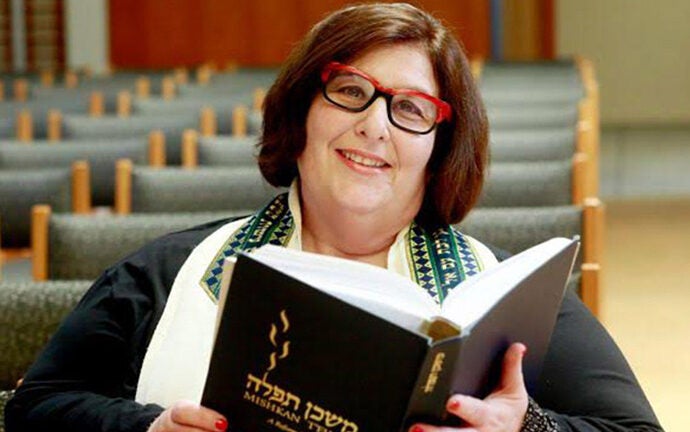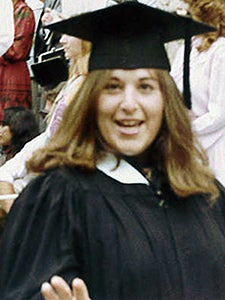
Alumna Rabbi Denise L. Eger is a voice of the people
When Rabbi Denise Eger was ordained in 1988, she began her rabbinical career serving a gay synagogue in Los Angeles. It was the height of the AIDS crisis.
Daily, she would make trips around the city to Cedars-Sinai Medical Center, LAC+USC Medical Center or Sherman Oaks Hospital to visit young patients being treated for the disease. At that time, the fear of AIDS — and particularly those who were living with it — was palpable, she said.
“These were the years when families just wouldn’t visit their children. They rejected them,” recalled Eger, who earned her bachelor’s degree in religion from USC Dornsife in 1982. “The nurses wouldn’t walk into the patients’ rooms, they were so afraid.” Etched in her mind is the memory of having to help some of the patients eat because they were too weak to feed themselves.
“I was 28 years old and working every day to bury young men who passed away,” Eger said. “Those years shaped me.”
Eger, who is the founding rabbi of Congregation Kol Ami, a Reform Jewish synagogue in West Hollywood, Calif., remains committed to helping those who are marginalized, and uses her rabbinate as a platform for social activism. She also serves as president of the Central Conference of American Rabbis (CCAR), which is the largest and oldest organization of rabbis in North America. Eger is the first openly gay or lesbian rabbi to hold the position as head of the Reform rabbis.
She advocates for issues of social justice, including equal rights for the LGBT community, prison reform, racial equality and economic justice. Last summer she and members of CCAR marched with the NAACP from Selma, Ala., to Washington, D.C., as part of a “Journey for Justice.”

She was also active in campaigns against Proposition 8 and Proposition 22 in California, which both sought to limit marriage for same-sex couples. She served on the boards of organizations that fought the ballot initiatives and spoke at rallies across the country. In fact, Eger performed the wedding ceremony on the steps of the Beverly Hills Courthouse for the first same-sex couple in L.A. County to be married in 2008 after the California Supreme Court ruled against the Prop. 8 marriage ban.
“Having worked so hard for so many years to see us come to a world where I can say, ‘By the power vested in me by the state of California,’ that was a profound moment for me,” Eger said.
From the South to Southern California
Eger’s early years were spent in the South, which cultivated the roots of her dedication to social activism.
“Growing up in Memphis, Tenn., where Dr. King was murdered, you can’t help but be surrounded by the civil rights struggle,” Eger said. She recalled Jewish friends whose families’ homes and businesses were the targets of hate crimes. “This is a legacy that is very important to my daily life growing up. That inspired me to see that wherever there’s injustice and oppression, good people can’t stay silent.”
After high school, Eger studied music at the University of Memphis. She aspired to be a cantor, the Jewish religious official who sings the liturgical portions of a service including prayers. But, when she visited a seminary in New York to pursue that career path, she was put off when told that she was too young to study for the profession.
“I decided then and there that I wanted to leave Memphis and think about what it was that I wanted to do with my life,” Eger said.
She transferred to USC to study religion. “It didn’t hurt that that year USC went to the Rose Bowl and I saw the team explode in ’78 and ’79 on TV,” laughed Eger, an avid sports fan.
A Jewish Scholar
Eger threw herself into Jewish life at the university. As a member of USC Hillel, Eger worked closely with the organization’s director at the time, Rabbi Laura Geller. Geller is the first female rabbi to lead a major metropolitan congregation, and the third woman ever in the Jewish Reform Movement to be ordained.
“At USC, I got the chance to work every day with a woman rabbi and see what that was like,” Eger said. “That really solidified my passion for the rabbinate.”
Eger also served as an outreach worker for then-USC President James Zumberge’s office to build connections with the Jewish community in Los Angeles.
“I felt very privileged,” Eger said. “Just two years before, I had been a young person from Memphis who knew nothing about the big city of Los Angeles, and within a year I was blessed to have amazing experiences on campus, immediately getting into college life. That was really a growing period for me, and the kindness and mentorship that I received at USC really helped launch me in a way that I will forever be grateful for.”
She recalled fondly studying with faculty members who inspired her, such as John Crossley of religion, with whom she worked on an honors thesis. “He was somebody who really took an interest in my well-being and academic excellence, and he pushed me, which I think helped me in all of my classes.”
Eger was the first-ever student to earn a minor in Jewish studies, a program offered in partnership with the Louchheim School for Judaic Studies at Hebrew Union College-Jewish Institute of Religion, just a few blocks from USC’s University Park campus.
At HUC-JIR, Eger felt lucky to learn from some of “the greatest Jewish scholars.” She studied medieval Jewish philosophy with Rabbi David Ellenson and learned about ancient Israel during the time when Jesus was alive from Rabbi Michael Signer.
“The relationship between Hebrew Union College and USC is a unique gem,” Eger said. “It’s something that really offered me an opportunity to be in a place at USC that, coming from Tennessee, I might not have ever considered.” It’s also where she studied to become a rabbi before being ordained on the college’s New York campus.
“Voice of my people”
From Eger’s office at Kol Ami, which means “voice of My people” in Hebrew, she has a view into the synagogue’s small sanctuary. The following verse from the prophet Micah is stenciled on the wall: “What does God require of you? To act justly and to love mercy and to walk humbly with your God.”
The line embodies Eger’s philosophy as a rabbi and what she hopes to impart to her congregants.
“It really sums up for me what our purpose on Earth is,” she explained. “If we’re doing the work of justice and we’re being compassionate human beings and we’re trying to walk with humility alongside our higher power, the world would be a much better place.”